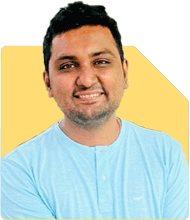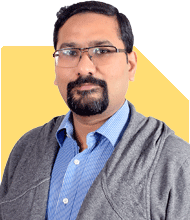Krishna Kumar |398 Answers |Ask -Follow
Workplace Expert - Answered on Feb 08, 2024
Before branching out on his own, he worked with companies like Microsoft, Rediff, Flipkart and InMobi.
With over 25 years of experience under his belt, KK is a regular speaker at industry events and academic intuitions, both in India as well as abroad.
KK completed his MBA in marketing from the Sri Sathya Sai Institute of Higher Learning in Andhra Pradesh and his management development programme from XLRI, Jamshedpur.
He has also completed his LLB from Nagpur University and diploma in PR from Bhavan’s College of Management, Nagpur, where he was awarded a gold medal.... more

I am a 30 year old guy having a total of 9 years of experience. I completed by dipllma and b.tech in Mechanical engineering. After my diploma i started working in a jewellery manufacturing company as an assistant production manager cum operations manager. Then i started working with a jewellery manufacturing company as a sales commission partner (proprietor) for 6.5 years. After that i am currently working in Smaft Chip Pvt Ltd as operations manager for last 9 months. Now the salary i am getting right now is very low as per my experience. And i am very mucb confused on if i should move to business analysis/management consultant or should i stick to operations management. And also i need help on path way guidance.
You need to stabilize with one company and in one function for atleast 2-3 years. Right now focus on getting yourself stabilized.
All the best.
You may like to see similar questions and answers below
Abhishek Shah | Answer |Ask -Follow
HR Expert - Answered on Nov 17, 2023
Mayank Rautela | Answer |Ask -Follow
HR Expert - Answered on Nov 19, 2023
Krishna Kumar |398 Answers |Ask -Follow
Workplace Expert - Answered on Feb 19, 2024
Aashish Sood |127 Answers |Ask -Follow
CAT, Management Expert - Answered on May 30, 2024
Nayagam P P |10931 Answers |Ask -Follow
Career Counsellor - Answered on Mar 03, 2026
Nayagam P P |10931 Answers |Ask -Follow
Career Counsellor - Answered on Mar 03, 2026
Dr Nagarajan J S K |2622 Answers |Ask -Follow
NEET, Medical, Pharmacy Careers - Answered on Mar 03, 2026
Dr Nagarajan J S K |2622 Answers |Ask -Follow
NEET, Medical, Pharmacy Careers - Answered on Mar 03, 2026
Dr Nagarajan J S K |2622 Answers |Ask -Follow
NEET, Medical, Pharmacy Careers - Answered on Mar 03, 2026
Ravi Mittal |706 Answers |Ask -Follow
Dating, Relationships Expert - Answered on Mar 03, 2026
Radheshyam Zanwar |6825 Answers |Ask -Follow
MHT-CET, IIT-JEE, NEET-UG Expert - Answered on Mar 03, 2026
Radheshyam Zanwar |6825 Answers |Ask -Follow
MHT-CET, IIT-JEE, NEET-UG Expert - Answered on Mar 02, 2026
Ravi Mittal |706 Answers |Ask -Follow
Dating, Relationships Expert - Answered on Mar 02, 2026
Ravi Mittal |706 Answers |Ask -Follow
Dating, Relationships Expert - Answered on Mar 02, 2026


























